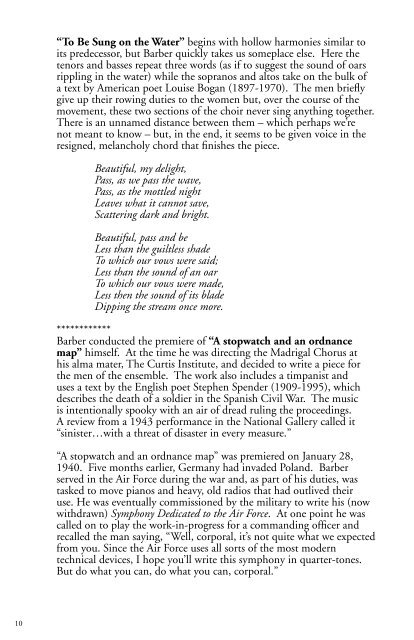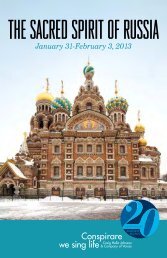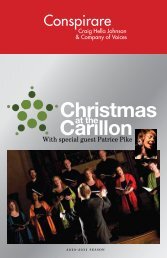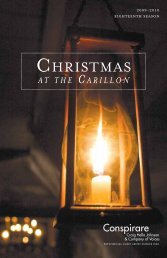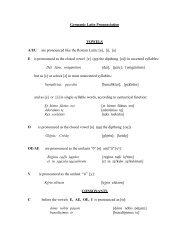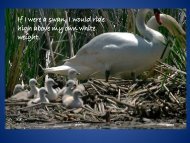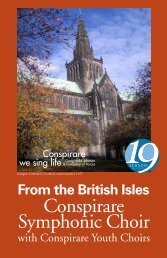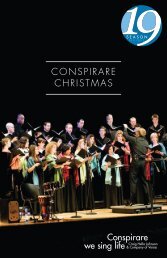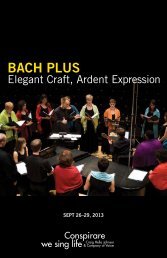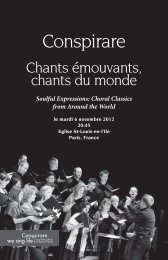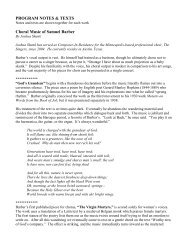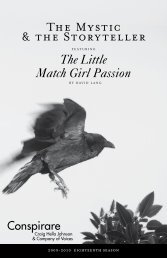Samuel Barber - Conspirare
Samuel Barber - Conspirare
Samuel Barber - Conspirare
- No tags were found...
You also want an ePaper? Increase the reach of your titles
YUMPU automatically turns print PDFs into web optimized ePapers that Google loves.
“To Be Sung on the Water” begins with hollow harmonies similar toits predecessor, but <strong>Barber</strong> quickly takes us someplace else. Here thetenors and basses repeat three words (as if to suggest the sound of oarsrippling in the water) while the sopranos and altos take on the bulk ofa text by American poet Louise Bogan (1897-1970). The men brieflygive up their rowing duties to the women but, over the course of themovement, these two sections of the choir never sing anything together.There is an unnamed distance between them – which perhaps we’renot meant to know – but, in the end, it seems to be given voice in theresigned, melancholy chord that finishes the piece.Beautiful, my delight,Pass, as we pass the wave,Pass, as the mottled nightLeaves what it cannot save,Scattering dark and bright.Beautiful, pass and beLess than the guiltless shadeTo which our vows were said;Less than the sound of an oarTo which our vows were made,Less then the sound of its bladeDipping the stream once more.************<strong>Barber</strong> conducted the premiere of “A stopwatch and an ordnancemap” himself. At the time he was directing the Madrigal Chorus athis alma mater, The Curtis Institute, and decided to write a piece forthe men of the ensemble. The work also includes a timpanist anduses a text by the English poet Stephen Spender (1909-1995), whichdescribes the death of a soldier in the Spanish Civil War. The musicis intentionally spooky with an air of dread ruling the proceedings.A review from a 1943 performance in the National Gallery called it“sinister…with a threat of disaster in every measure.”“A stopwatch and an ordnance map” was premiered on January 28,1940. Five months earlier, Germany had invaded Poland. <strong>Barber</strong>served in the Air Force during the war and, as part of his duties, wastasked to move pianos and heavy, old radios that had outlived theiruse. He was eventually commissioned by the military to write his (nowwithdrawn) Symphony Dedicated to the Air Force. At one point he wascalled on to play the work-in-progress for a commanding officer andrecalled the man saying, “Well, corporal, it’s not quite what we expectedfrom you. Since the Air Force uses all sorts of the most moderntechnical devices, I hope you’ll write this symphony in quarter-tones.But do what you can, do what you can, corporal.”Perhaps he should have shown the man “A stopwatch…” instead.Immediately before the men begin singing “He stayed faithfully inthat place,” the timpanist sets about sliding the pitches of the drumswith the tuning pedals and <strong>Barber</strong>, a composer who was looked atas somewhat old-fashioned during his lifetime, sounds decidedly“modern.”A stopwatch and an ordnance map.At five a man fell to the groundAnd the watch flew off his wristLike a moon struck from the earthMarking a blank time that staresOn the tides of change beneath.All under the olive trees.A stopwatch and an ordnance map.He stayed faithfully in that placeFrom his living comrade splitBy dividers of the bulletOpening wide the distancesOf his final loneliness.All under the olive trees.A stopwatch and an ordnance map.And the bones are fixed at fiveUnder the moon’s timelessness;But another who lives onWears within his heart foreverSpace split open by the bullet.All under the olive trees.************Throughout the 1960s, <strong>Barber</strong> penned numerous arrangements ofpreviously-written material. “Heaven haven: A nun takes the veil”was originally a song for voice and piano (on a poem by Gerard ManleyHopkins) from his Four Songs, Op. 13. In its transformation fromart song to choral piece, the piano part was curiously left out by thecomposer. However, given the desire for refuge in the poetry, perhapshe felt a pianist might intrude on the delicate music.I have desired to goWhere springs not fail,To fields where flies no sharp and sided hailAnd a few lilies blow.And I have asked to beWhere no storms come,Where the green swell is in the havens dumb,And out of the swing of the sea.************10 11


